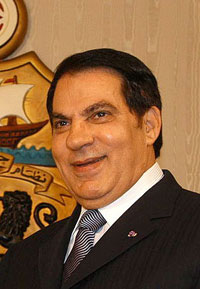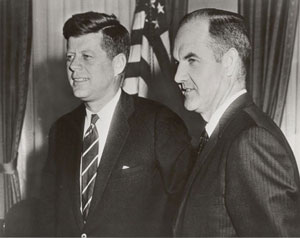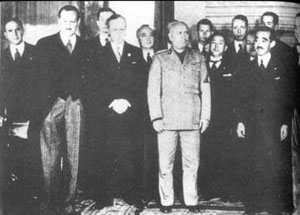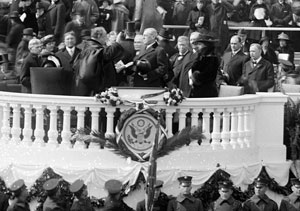This week in history: November 5-11
5 November 2012
This Week in History provides brief synopses of important historical events whose anniversaries fall this week.
25 Years Ago | 50 Years Ago | 75 Years Ago | 100 Years Ago
25 years ago: Tunisian coup deposes president
 Zine el Abidine Ben Ali
Zine el Abidine Ben AliOn November 7, 1987, Tunisian President-For-Life Habib Bourguiba was deposed by former general and interior minister Zine el Abidine Ben Ali. Bourguiba, who had ruled the North African nation since its independence from France in 1956, was overthrown in a bloodless coup amid charges of “incompetence.” Ben Ali announced in a radio broadcast that he was removing Bourguiba from office under Article 57 of the Tunisian constitution.
Concerns about Bourguiba’s ability to rule culminated in the determination by a team of “medical experts” that he was unfit to execute the office. Upon taking power, Ben Ali, a pro-imperialist military leader responsible for internal security, assured Italy, France and the US that under his regime close ties with the Western powers would continue.
Years later, in 1999, Italian head of intelligence Fulvio Martini revealed in secret testimony to a parliamentary committee that Italy was behind the 1987 coup. Martini headed the Italian intelligence from 1984 until 1991. He testified that the orders for the coup came from Premier Bettino Craxi.
Ben Ali would rule Tunisia until January 2011, when mass popular uprisings forced him to flee the country.
50 years ago: Democrats gain in 1962 midterm elections
 Kennedy and McGovern, 1961
Kennedy and McGovern, 1961The US midterm elections held November 6 delivered three more seats to the Democratic Party in the Senate, raising its majority to 64-36. Democrats held on to their substantial lead in the House, losing only three seats, unprecedented for a midterm election since the Roosevelt administration.
Notable victors in the Senate included George McGovern of South Dakota and Birch Bayh of Indiana, both of whom unseated Republican incumbents, and Edward Kennedy of Massachusetts, who won the seat vacated by his brother John when the latter was elected president. Democrat Abraham Ribicoff picked up the Connecticut seat of the retiring Republican, Prescott Bush. Mike Mansfield of Montana would continue as Senate majority leader, while Everett Dirksen of Illinois maintained the position of minority leader.
The election was also notable for the defeat of Republican Richard Nixon, who was running against California’s liberal governor Pat Brown and who had just barely been defeated for the presidency by Kennedy two years earlier. In his concession statement, Nixon declared it was his “last press conference” and told the media that “they wouldn’t have Richard Nixon to kick around anymore.” The New York Times editorial board wrote that “unless a political miracle occurs,” Nixon was “unlikely to ever compete for important electoral public office again.”
Though not a landslide, the results indicated an electorate that favored the social reform legislation pushed by the Kennedy administration—including the probability of the implementation of an old age health care insurance system tied to Social Security—and fearful of Republican saber-rattling in relationship to the Cuban missile crisis, which had just passed.
Even at high tide, however, American liberalism was facing a mounting crisis. In South Vietnam on November 5, two US officers were killed when their plane was shot down, bringing to 34 the number of Americans killed in a counter-insurgency war that Kennedy had decided to escalate.
75 years ago: Italy joins Germany and Japan in Anti-Comintern Pact
 Anti-Comintern Pact
Anti-Comintern PactOn November 6, 1937 the Italian government joined the Anti-Comintern Pact with Germany and Japan at a conference in Rome. Count Ciano signed for Italy. Signing for Japan was Hotta, the Japanese ambassador to Italy, and for Germany, Foreign Minister von Ribbentrop. The pact committed Italy to join with Germany and Japan in war should any of the three be attacked by the Soviet Union.
Italy’s move toward a military alliance with Germany came after the collapse of the alliance among France, the United Kingdom and Italy known as the Stresa front , which had been a 1935 reaffirmation of the anti-German Locarno Pact based on an independent Austria and a disarmed Germany. Mussolini believed that the UK had violated the Stresa Front through the Anglo-German naval treaty of 1935, which allowed Germany to rebuild its navy, and thereafter Italy drifted toward the German orbit.
In a telegram, Hitler congratulated Italy for joining “the community of nations which stand together in defence against the efforts of world Bolshevism to disturb their eternal peace.” In another communique, the Japanese government equated its war on China with Italy’s intervention on the side of Franco in the Spanish Civil War.
“Today we have before our eyes concrete evidence showing that the internecine war in Spain and the surreptitious activities of the Communist Party and the Anti-Japanese Peoples Front which are disturbing the stability of East Asia are both due to the machinations of the Communist International,” the Japanese statement read.
100 years ago: Woodrow Wilson elected president
 Wilson's swearing in
Wilson's swearing inOn November 5, 1912, Woodrow Wilson was elected 28th president of the United States, despite receiving only a minority of the vote. Wilson, the Democratic Party candidate in the presidential race, won 42 percent of the popular vote and a large majority in the Electoral College, defeating his nearest rival, Progressive Party candidate Theodore Roosevelt, who received 27 percent of the popular vote.
Wilson’s victory was aided by the split in the Republican Party in June, between Roosevelt and incumbent President William Howard Taft. Roosevelt had won the handful of Republican primaries, but Taft had been nominated Republican candidate as a result of his effective control over the Republican National Committee. Roosevelt and his supporters formed the Progressive or “Bull Moose” Party to run a third-party campaign in the presidential election. Taft won 23 percent of the popular vote. Roosevelt was closely identified with the “Progressive” tendency in bourgeois politics, which denounced the major trusts and called for reforms to the worst excesses of capitalism to prevent the emergence of a mass socialist movement.
During the campaign, Wilson combined the invocation of Jeffersonian ideals, warning against the danger of “big government,” with demagogic denunciations of the trusts in the vein of the Progressives. He warned that a Republican presidency would threaten social upheaval, exclaiming in one speech, “God forbid that we should bring about a state of politics in which open revolt should be substituted for the Ballot Box!”
Fears of social upheaval were also a response to the mass support registered for a socialist perspective during the elections. Eugene Debs, the leading figure in the American socialist movement, won over 900,000 votes. Underscoring the anti-democratic character of the Electoral College, whereby presidents are chosen by electors selected state-by-state, Debs received no electoral votes, despite winning six percent of the popular vote.
Wilson would go on to serve two terms as president, from 1913 to 1921, and launch the American intervention into the First World War.





Follow the WSWS